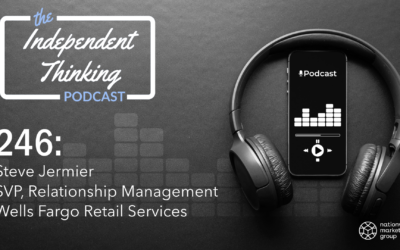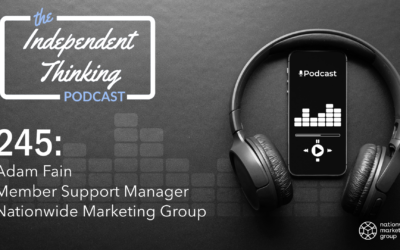Johnnie Kennel, one of three co-owners of Urbandale, Iowa-based retailer Royal Flooring, dishes on their new location and one-stop-shop business strategy.
Rob Stott: All right, we are back on the Independent Thinking podcast. Right now, turning our attention to another member of Nationwide, and one that I’m pretty jazzed to talk about, a company that’s got a lot going on right now, in terms of growth and expansion. So, excited to talk to Royal Flooring, and more specifically, Johnnie Kennel. Appreciate you taking the time to call in and talk to us.
Johnnie Kennel: Yeah, you bet.
Rob: So, first of all, give us a little bit of a background on the business. You know, as I said, you’re one of three owners for Royal Flooring. Give us the background on how you started, where you operate, and all that sort of good stuff?
Johnnie: Yeah. So, we started in 2005. It originally was a paint store, that we came into flooring. Then, went from flooring, we added granite, granite installation. We started in 2005. In 2010, we added cabinets and appliances. As we brought cabinets and appliances in, we got rid of paint. Paint was a pain in the butt for a while.
Yeah, now we are a flooring, granite, appliance, cabinet, window blinds, windows. We sell about, pretty much anything after drywall.
Rob: Gotcha. Sort of all over the place. You know, you mentioned the timing … Well, all over the place, I say that, but you know, all over the place inside the home.
Johnnie: Yeah.
Rob: Those important finishings and stuff. You guys, you’re out there in Urbandale, Iowa. The timing you mentioned, 2005. Two years later, you’re facing a recession. Three years later. What was it like getting a business up and running, and then having to face that kind of an environment?
Johnnie: Yeah, that was a little scary to go through. It was nice for us, because we were so small the first couple years. We just grew with it, and grew through it. We didn’t have a whole lot of overhead at the time. Honestly, it was a lot of luck. I mean, the recession helped us. I can’t say that for a lot of people in Des Moines area, but, yeah. Definitely we just grew right through it.
Rob: That’s crazy. What led you down to this career path? What attracted you to, I guess, first a paint shop, but now into furniture and appliances?
Johnnie: I mean, the three owners, all of us came from different backgrounds. We grew up together. We all went to college for completely different lines of work. We just stumbled into … Had a relative that wanted to start a paint store, and people kept coming in, asking … or, we were asking them, “What are you repainting?” Or, “What’s going on in your home?” And saying that they were getting ready for new flooring, we kept hearing that, over and over again.
So, we got a hold of some flooring reps, and just started adding some displays in our paint store. Then, a few months later we said, “Well, let’s just start selling flooring.” That’s how it began. Then, it just snowballed into where we’re at today.
Rob: Yeah. It sounds like you guys … Flooring was the first step, and then did you approach it from growing with your market, and what customers were asking for? How do you get into, then, from flooring to furniture, to appliances?
Johnnie: So, the flooring, yes, just lead into other trades in their house. So, we’re in there doing flooring, and we notice people are getting granite countertops. So, we pursued that, and then we wanted to sell appliances. Then, talking to an appliance rep, and trying to figure this out. We need to put appliances in displays, into cabinet displays. So, sitting down with a cabinet designer, we said, “Why don’t we just sell cabinets as well?”
So, cabinets and appliances came at about the same time, and naturally that’s just how it happens. It worked out pretty good. In 2010, we opened up a new showroom. The appliances and cabinets was a nice additive for us. It worked out pretty good.
Rob: Yeah. You talk about expansion. I know you guys are now looking at … Well, not looking at, you have started to expand, again, with this move into appliances. Tell us a little bit about that. You have a new store opening up soon, here, right?
Johnnie: Yeah, yeah. We have a showroom right now, it’s about 14,000 square feet, and we have a warehouse connected to it. We opened this in February 2015. Right out of the gate, we ran out of room. We under built, and we need more room for salespeople, and just needed more showroom. So, we had a plan drawn up to add onto our building, and that was a few years ago. Then, in the process of that, we found some other ground and just decided to build a bigger showroom, where we could fit.
We had two locations, and we just wanted to get everybody under one roof. This is, like, a 25,000 square foot facility.
Rob: Wow. So, it’s going to be one … Will you consolidate into this one showroom, or will you guys continue to operate multiple stores?
Johnnie: No, we’re going to close this one down. We have another location. In Des Moines, how the market works here, when we’re selling all the things we sell, appliances, cabinets, flooring, granite, it would be … If we were just selling flooring, I imagine, all these little towns around Des Moines, we could have a flooring store. But, when you have this big — all this selection, it’s hard to replicate that in all these other towns.
Now, the economy is pretty good, I don’t think people mind driving that far. We’re getting a lot of people in the surrounding towns, and surrounding areas, and two hours away are driving to us, to shop under one roof, and get everything under one roof.
Rob: Gotcha. Well, you talk about everything under one roof. I know there’s another part to this new building that is pretty unique, maybe, in some respects. There’s a restaurant that’s going to be in there as well, right?
Johnnie: That’s right, right. We bought into a franchise restaurant called The [Proaching 00:06:59] House. So, it’ll be connected to the flooring store, and you’ll be able to enter it within the flooring store, if need be. I joke with everybody, it’s so we can keep our employees here, and they don’t have to leave.
Rob: Just bring them lunch.
Johnnie: Yeah, that’s right.
Rob: No, that’s awesome. Hey, maybe that’s one way. You know, when you talk about the possible crossovers, from the retail space to a restaurant space, what are some of the things that get you excited when you think about what you can do with two spaces like that, that are combined?
Johnnie: Oh, the nice thing about being in the cabinet industry, and the appliance industry, is that set all of our boutiques up, and they’re live. So, we can cook out of them, we do demonstrations, and cooking shows, and cooking classes. Just having the restaurant there, and be able to have bigger events. We try to have an event once a month, and it might not have anything to do with what we sell. Like, a Wine Night, or a Ladies Night. Having that restaurant attached to us, for catering purposes, just makes it that much more convenient.
Rob: Now, the kitchen for the restaurant … I know, obviously, you guys probably sell only household appliances. Is there any way to tie in what you do with the appliances that are used in that restaurant space?
Johnnie: I mean, we would … So, the restaurant kitchen itself, that’s all commercial. It’s completely different type of appliances. Maybe, somewhere down the road, we’ll get into selling commercial appliances. It’s its own entity, kind of, just able to be attached to the flooring store. Mostly for convenience.
Rob: Gotcha. It’s really cool, and something that, one way or the other, is something unique that you don’t see that type of tie-in, where it’s two separate businesses. Having you guys, you know, control both of them is got some pretty cool opportunities attached to it.
Johnnie: Yeah, it’s getting a big buzz around the Des Moines area. Having a flooring store with a restaurant attached to it, it sounds kind of odd, but we make it fun.
Rob: No, that’s awesome. You know, I want to turn to the services that you guys offer. It’s permeated this conversation, already, but diving through your website, and learning a little bit about you guys, you’ve got all kinds of things that you offer, beyond just the products themselves. I mean, you mentioned interior design work, and building. I think I saw some employees of yours that are actually kitchen and bath designers as well.
Talk about how adding those kinds of things to your mix, and really becoming this one-stop shop for a client? Where, you know, they’re not working with a designer somewhere else that’s coming to you for products, you guys can actually offer those services to them.
Johnnie: Yeah, that’s been one of the best things we’ve done in the past few years, is having in-house designers. We consider ourselves, or are striving to be a design center. It works very, very well when our employees aren’t necessarily just salesmen, they all have a little bit of design background, or are able to design. Having dedicated designers, it just makes the customer feel that much more comfortable, and it just brings a lot to the table. When they can bounce around from flooring, to appliances, to cabinets, and just walk hand-in-hand with the customer, it’s a little more professional and credible, I guess.
Rob: How long ago was that a move that you guys made, to bring in in-house designers?
Johnnie: That was a couple years ago. We noticed … The reason why this came up is, people were asking if we had in-house designers and we would just say, “Oh, yeah, we do.” We’d go over and grab a cabinet designer, and most of our cabinet designers are female. It just worked out because women feel, I think, feel more comfortable buying from women is what we gathered. It just worked out to where, yeah, we thought that would be a great additive, to just have full-time designers. I can stop bothering the cabinet gals.
Rob: No, that’s awesome. I know you talk about expanding staff. You guys also, not just in the design space … If I remember right, we were talking that you guys are diving into some more marketing, and bringing in an in-house marketing person?
Johnnie: Yeah, yeah. That’s another thing, is the social media craze, and what your online presence can bring. In business, it’s just stuff that I don’t understand, or have time. Now, we have Courtney, our full-time marketing person, takes care of all that stuff. She’s brilliant, and she’s opened our eyes to a whole new world. Yeah, having someone dedicated to that … This has been the last year, this has happened, and we’ve already seen just tons of online chatter, and just people walking in, and saying that they’ve seen things on Facebook, Pinterest, and Instagram. Our website has had a lot more clicks, and traffic. It’s been a tremendous … I mean, we were hesitant at first, but giving it a shot, actually, has paid off.
Rob: Yeah. You know, a couple ways I want to lead with … There’s two ways I can go with questions, here. One I want to start with is, that way of thinking where, you’re a retailer and, you know, there’s plenty of services out there. Even at Nationwide, there’s services around marketing to help these independent businesses with their marketing efforts. But, to have the foresight, and desire, really, for you guys to go and make this a part of your everyday business, and what you do, and make it a full-time thing for you, where does that come from? You already talked about the benefits a little bit, but what has it done for you, from a business perspective?
Johnnie: All of our vendors and stuff, they have some type of program to help us out in the social media world. But, I mean, I’m 39 years old. I know, I understand some of this stuff. It’s almost like we do need an interpreter to then relay to us, what is good, and what’s best for our company. Since we have all these different things that we sell, the flooring side of it is not actually, maybe, that’s a different target than we’re trying to sell appliances for.
So, having somebody like Courtney, helping us out, and just guide us through all this stuff, and tell us what’s going to work best for us. Other than that, I don’t know how we would … It would just absorb so much of our time, and it would be pretty difficult.
Rob: Yeah, yeah. Totally understandable. I, then, look at it from the other side, strictly speaking of digital presences. You guys, your website, I have to say, diving through it, is one of the more impressive I’ve seen. Just from a visual standpoint, a lot of big images, and breaking everything down by how you do stuff, services wise. Then, the products themselves. So, what has that done for you? Is the website new for you guys? I guess, start there. How long ago did you guys launch a web presence?
Johnnie: So, it was … We’ve had, in the past, we’ve worked with a few companies. It was kind of a template setup. I mean, it’s probably been four years now, that we’ve had a decent website. Before that, it was pretty embarrassing. The size of company we were, and we had pretty much an amateur website.
So, we finally worked with a company here in Des Moines, that helped us build a website. Our showroom, I think, is very, very, nice looking, and the kitchenettes and displays that we have here are very professionally done. We wanted to show that online. So, all those kitchens, and all those displays you see are actually in our showroom. A lot of the times, they look like stock photos.
Rob: Yeah.
Johnnie: They look a little more professional online than they do in person. Yeah, that’s all us, that’s all our showroom. Yeah, that has been a huge help, in letting customers see, you know, what do we do, what our showroom looks like, and just what we’re actually capable of doing. We can reach a larger audience, faster.
Rob: Yeah. I mean, how much of the actual business is done online? Or is it more, really, just a tool for you guys to drive people into your store, to meet with you?
Johnnie: Mostly, it’s a tool right now. In all the stuff that we do, and we sell, a lot of times, customers really have to touch it, they have to feel it. That really helps us out.
At the end of the day, what they’re doing is, they’re pretty much asking our advice on what product they should actually get. It’s hard to get that online, ordering things online. You don’t know what you get until it shows up. In our industry here, I think we’re pretty safe that people really want to come in and talk to a salesperson, and touch and feel the product before making a decision.
Rob: Gotcha. I mean, you mentioned, it’s only really been four years of having a strong presence like this. Is it a clear difference between the time since you’ve had a website, and what it’s done for your business, than what it was like beforehand?
Johnnie: Yeah. I mean, I do the same thing. I go online, and if I see a company, or a product, or something I’m interested in, I straight away, go on the Internet, like everybody else. It’s, I think, the first impression you’re going to have. People will go to the website before they’ll come into our showroom.
So, if the website is nice, and professionally done, then it says a lot about our company. Their opinion of us is a lot higher, straight out of the gate.
Rob: Yeah. Cliché, but sort of like an always-on billboard, in a sense.
Johnnie: Yeah, yeah.
Rob: Yeah. So, you know, I want to close here. We’ve talked a lot about a lot of the stuff, really, that’s gone well for you guys, and that you’re doing well. But, every independent, every business out there, independent or not, there’s going to be challenges. What, for you guys … What, for Royal Flooring, in the Des Moines area, is a big challenge for you right now, that you’re facing? Or, the other cliché, of keeping you up at night?
Johnnie: Let’s see. I would have to see, just getting talented people to come work for us. It sounds, you know … It doesn’t sound very lucrative to say that you’re a flooring salesman, but after working here, and training all our people, they can make a lot of money if they’re good at it. Just finding good help is one thing that keeps us up.
As far as the industry goes, I mean, you think corporate, big corporations coming into Des Moines, should be something we’re scared about, but it’s really not. As long as we train our guys, our salesmen and saleswomen the right way, I think that holds a lot of water, and it just makes us more credible overall. So, we’re not … I’m not too worried about those type of things.
Yeah, we’re excited for the new showroom. We’re taking a big step into the next chapter of our business.
Rob: No, that’s awesome. That first point about staffing is not one to be glossed over, either, as you mentioned. It’s one that, here in the next couple episodes of this Independent Thinking podcast, we have a conversation planned to dive into that, with the National Federation of Independent Businesses. NFIB, I think, is the acronym. Something that they’re looking into.
When you think about how you’re addressing that, what is it that you’re doing? What advice could you have for other independent owners out there, as it relates to staffing? How do you find talent, or recruit talent? Not even just that, it’s the other portion of maintaining it.
Johnnie: Yeah. I would say, I wouldn’t be so worried about if you … Like, how we built our business, we haven’t been too worried. We act first, and jump in head first, and just do it, just make it happen. We learn all along the way, how to adjust on the fly. That’s just been good for us.
Finding good work, we train people from … I mean, they come from all different walks of life. Actually, in our showroom, our 25 salespeople we have, not one of them has came from the other … Maybe, one person, has come from that industry that they’re in right now.
Rob: Wow.
Johnnie: So, they sell cabinets for us. They previously had no idea about cabinets. But, you’ve just got to be there, just show them the way. Have good work ethic, and just believe in the process.
Rob: That’s awesome. It leads to shiny new showrooms that have restaurants attached to them.
Johnnie: That definitely helps.
Rob: Nah, that’s awesome. Well, Johnnie, I appreciate you taking the time, and letting us into the Royal Flooring showroom, and things you’ve got going on down there in Iowa. We appreciate it.
Johnnie: Yeah, thanks a lot.
Rob: Awesome. Hope to see you at Prime Time.
Johnnie: You bet.




